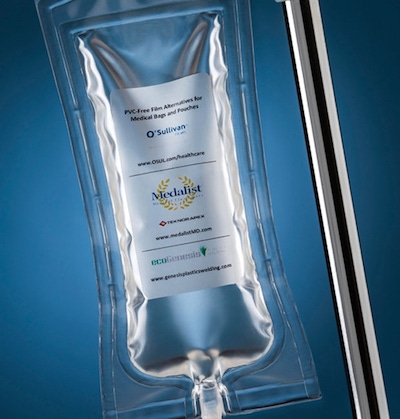Novel technology expands types of polymers that can be RF welded without additives
July 5, 2016

A proprietary radio-frequency (RF) welding technology from Genesis Plastics Welding (Fortville, IN) enables the joining of thin-gauge polyethylene, polypropylene and low-loss polymers without the use of plasticizers or additives. The bolt-on ecoGenesis technology reportedly can allow most existing RF machines to weld polymers with dielectric constants well below the 0.02 level, facilitating manufacturing with an array of materials other than PVC and polyurethane (PU). Medical, automotive, military, packaging and consumer applications stand to benefit, according to Genesis Plastics Welding.
 In a white paper, the company reported the results of an evaluation of the technology by business consultancy OmniTech International (Midland, MI). According to OmniTech, ecoGenesis “defies the industry’s traditional mathematical formulas and art that predict the success of a good RF weld.” Prior RF welding art allowed for only a few polymer films—notably PVC and some PUs—as candidates for a good RF weld, according to Genesis Plastics. “OmniTech confirmed that films, copolymer films and fabrics with low dielectric factors can efficiently and effectively be RF welded with ecoGenesis without the aid of coatings, adhesives or other costly treatments,” noted the company in the white paper. OmniTech’s analysis was jointly paid for by Genesis Plastics Welding and Dow Chemical Co.
In a white paper, the company reported the results of an evaluation of the technology by business consultancy OmniTech International (Midland, MI). According to OmniTech, ecoGenesis “defies the industry’s traditional mathematical formulas and art that predict the success of a good RF weld.” Prior RF welding art allowed for only a few polymer films—notably PVC and some PUs—as candidates for a good RF weld, according to Genesis Plastics. “OmniTech confirmed that films, copolymer films and fabrics with low dielectric factors can efficiently and effectively be RF welded with ecoGenesis without the aid of coatings, adhesives or other costly treatments,” noted the company in the white paper. OmniTech’s analysis was jointly paid for by Genesis Plastics Welding and Dow Chemical Co.
Benefits of the technology, according to Genesis Plastics Welding, include lower manufacturing costs because it eliminates the need for expensive additives and allows for the use of more economical materials and improved product performance and appearance since the absence of heat-seal additives results in a clean final structure.
In medical manufacturing, the technology enables the replacement of PVC, which has come under scrutiny in some quarters for health-related issues involving plasticizers. However, there are numerous reasons an OEM may look to replace materials within a product or device, noted Tom Ryder, President and CEO of Genesis Plastics Welding. “In some situations, materials may not be performing to a desired specification, or a client may be looking for different aesthetics or searching for cost savings. Often when PVC is not performing as desired, manufacturers look to PU first, since it is one of the most durable films in medical device manufacturing today, but it comes with a hefty price tag,” Ryder told PlasticsToday. “Our ecoGenesis technology allows OEMs the opportunity to consider lower cost olefin films, said Ryder. “Most recently we’ve worked with large medical device OEMs to replace PU with olefin films in products like ostomy bags, laparoscopic balloons, negative pressure wound care, patient positioning devices, hemostasis devices and medical device coolant bags. The good news for the industry is that multiple companies (PolyOne and Teknor Apex, to name two) have developed films created from blended olefin compounds that are more durable than PVC and perform more similarly to PU materials while costing much less than PU. Several options abound for sourcing,” said Ryder.
The technology is also suitable for automotive OEMs seeking to replace RF-welded PVC with low-loss replacement materials in air bag sensors, car covers and lumbar supports, for makers of consumer goods seeking to satisfy market demand for PVC-free products and in packaging applications such as shielding bags and rigid retail containers.
Certified to ISO 13485, the international quality standard for medical manufacturing, Genesis Plastics Welding provides ecoGenesis welding as a contract service and licenses the technology to qualified plastics welding manufacturers for private use.
About the Author(s)
You May Also Like




